Ready for your next international vacation? No matter where your travel plans take you, we’ve all forgotten something, right? Read our international travel checklist with these simple tips on what not to forget BEFORE departure to ensure your trip runs smoothly.

This post may contain affiliate links. If you click through and buy, TravelingInHeels will get a small commission. Thank you for your support!
International Travel Checklist: What Not To Forget
Table of Contents
More Americans are traveling abroad than ever before. Everywhere from over the border to Mexico to across the pond to Europe, Americans are exploring the big, wide world.
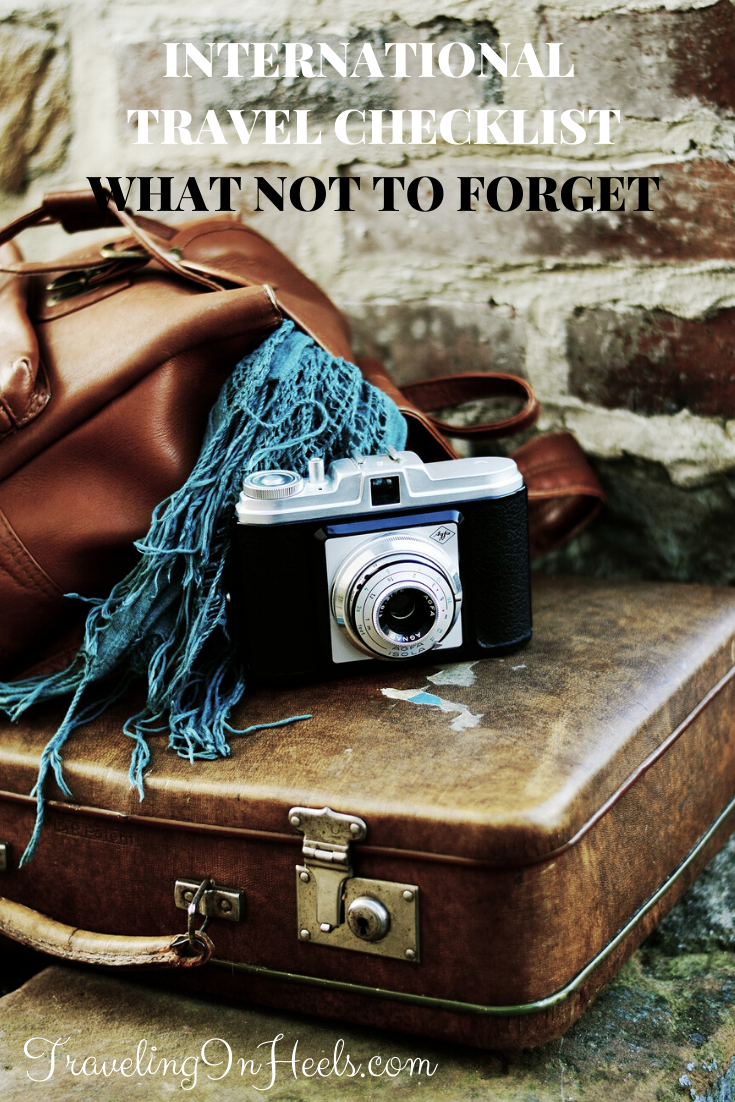
Have you never traveled overseas before? Are you an experienced traveler? Either way, the prospect of international travel can be daunting. Long haul flights and delays. Foreign languages and unusual cuisines. And yet, the adventure is simply too much to resist any longer. But, there are many things to consider before you embark on your journey.
Let’s get started what not to forget on our simple international travel checklist.
Get Travel Insurance
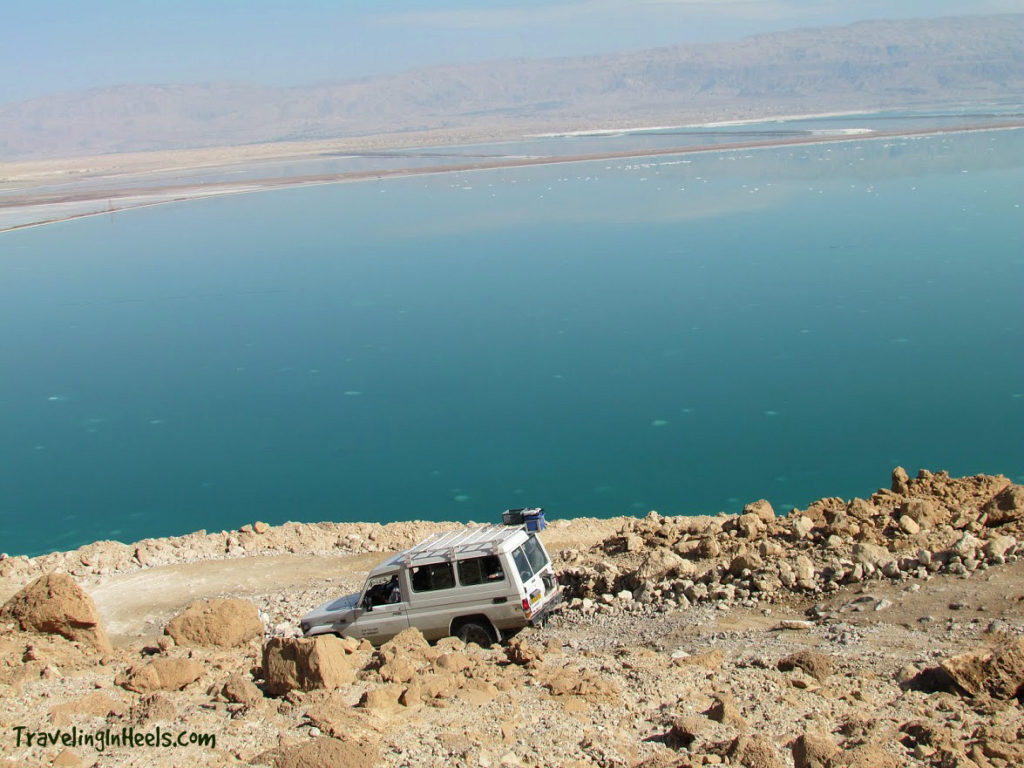
As more Americans flock overseas, buying travel insurance is becoming increasingly common for travelers. With so many unknowns, ranging from family emergencies to natural disasters, your exciting international adventure can easily turn into an absolute headache.
Whether you’re going for a few romantic days in Paris or exploring the Amazon rainforest in Brazil, you need to make sure you’re protected in case of an emergency. Even if your airplane gets canceled or there is an error with your hotel, you should make sure that you’re covered by travel insurance.
Travelers are increasingly not taking chances and they’re choosing to invest in the value and peace of mind that travel insurance can provide, for international as well as domestic and cruise vacations.
Do you want to check out more? Discover everything you need to know if you are a nationwide private client.
Safety and Security Information
Read the Travel Advisory and Alerts for the countries you will be visiting at travel.state.gov/destination. Review entry/exit requirements, visas, local laws, customs, medical care, road safety, etc.
Write down contact details for the nearest U.S. embassy or consulate to carry with you in case of an emergency while traveling.
Do Your Homework About Your Destination
You can always book a flight and go somewhere that you know nothing about. However, you may prefer to learn about the destination before you arrive. Learn about the laws and rules in the country. You don’t want to find yourself in trouble by mistake.
If you are traveling to exotic destinations look for travel health advice on websites like CDC and TravelHealthConnect. It’s really important to be informed about diseases and illnesses you might encounter on your adventure.
Also, pay attention to any other social etiquette. For example, how much do you tip in the country? What are the best dining etiquette tips?
Need travel inspiration? 21 Best International Family Vacations Travel
Get Informed: Prepare Your Travel Documents
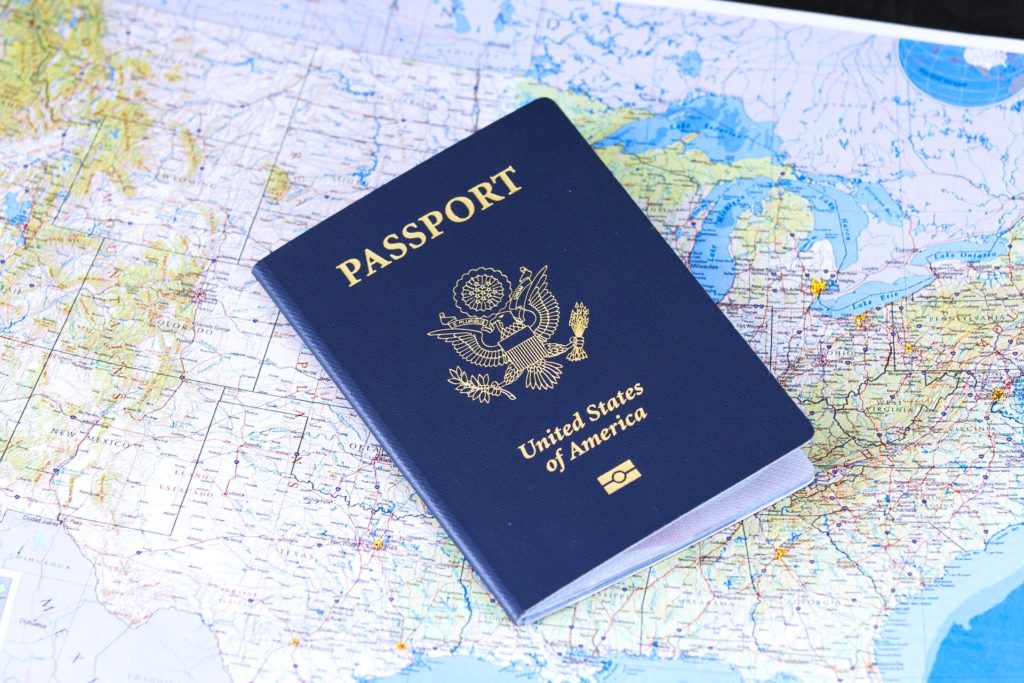
When you’re traveling overseas, ensure that you have all of the relevant travel documents. Without the right documents, upon arrival, you may decline entry to the country and be sent back home.
Depending on your destination, make sure you have an up-to-date passport valid for at least six months after you return home — and have at least to blank pages.
Many countries require a visa to enter the country. Contact the embassy of the countries you will be visiting for more information.
Traveling alone with kids or grandkids, foreign border officials may require custody documents or notarized written consent from the other parent (or the parents of your grandchildren). Check with the embassy of your foreign destination before traveling to see what you may need.
Other possible travel documents needed include details on your accommodation, a letter from the embassy or a resident of the country, and an outgoing flight already booked.
Finally, make two copies of all these documents and leave one behind with your travel agent and/or close family member. Keep one set of copies for yourself. That way if your passport, visa, itinerary, etc are lost or stolen along the way, you can contact them to expedite these copies back to you. Also, take a picture of all these items on your smartphone, so you also have copies in your possession.
TIP: To help prevent theft, do not carry your passport in your back pocket, and keep it separate from your money
International Driving Permit

Many countries do not recognize a U.S. driver’s license, but most accept an International Driving Permit (IDP). You may also need supplemental auto insurance. Read more about driving and road safety abroad before you go.
Get a Health Checkup Before Your Journey
If you’re traveling abroad, you need to make sure you’re feeling strong and healthy. You may decide to get a health check-up before you embark on your adventure.
You may also require vaccinations to protect yourself against any diseases in the country abroad that your body may struggle to cope with. Speak to your family doctor
Please note that some prescription drugs, including narcotics and some U.S. over-the-counter medications, are illegal in other countries. Check with the embassy of your destination(s) about regulations and documentation before you travel.
Money Matters

Before going abroad, notify your bank and credit card companies of your travel, as this will prevent them from blocking your account due to fraudulent charges while you’re overseas. Whenever possible, it’s wise to use a credit card to make payments. This is much safer than using any other kind of payment. But do confirm the foreign transaction fee on your credit cards, prior to departure.
About four to six weeks before departure, order international currency from your bank. It’s important to have local currencies once you land at your destination.
For information about using cash, debit/credit cards, and ATMs overseas, read information about your destination.
Make Sure You Stay Connected Back Home
Connect at home and during your international travel is easier than it used to be. Many cell phone carriers offer unlimited international calls or texts, such as my carrier T-Mobile. Others may require arrangements for your phone while you’re abroad.
The simplest solution is to call your carrier to check on the many different deals offered for international phone calls and data packages. You may also need to purchase a SIM card in the country once you arrive.
TIP: Don’t Forget Your Adapter and/or battery back-up! We spend an average of 5 hours per day on our smartphones. This runs down your battery really quickly. Imagine the nightmare vacation you’ll have if you don’t bring your adapter with you. You won’t be able to charge any of your devices.
Avoid Packing More Than You Need
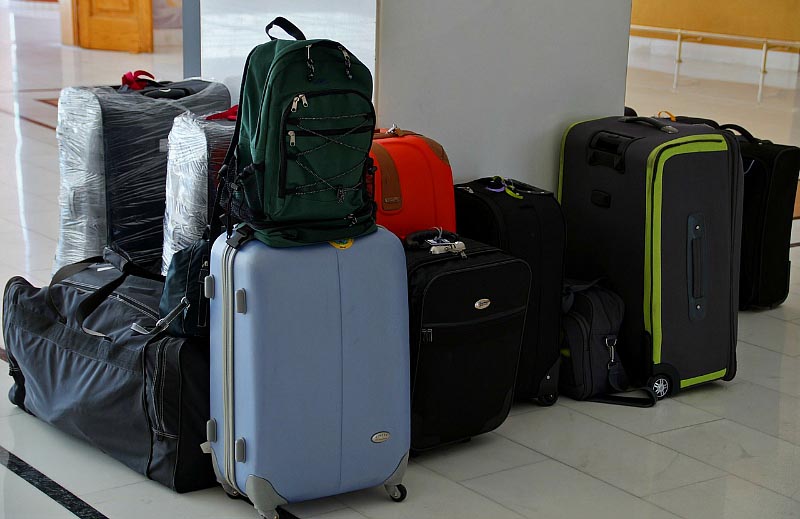
Around 65% of people get stressed when they have to pack for a vacation. You’re probably concerned that you’re going to forget something really important. But, that doesn’t mean you should pack hundreds of pairs of underwear. Hopefully, you won’t need that much.
You need to plan carefully for the number of clothes you’re going to need. Whenever in doubt, pack light. You can always buy clothes when you’re abroad.
Shop Around for the Best Deals
Flights and accommodation can be really expensive. This is usually where you’re forced to spend your big dollars. But, you can get some amazing deals on hotels and flights if you shop around. Definitely don’t go with the first offer you see.
Making sure you book a great hotel can really make a difference to the success of your vacation or not.
Brush Up on the Language
Over 75% of Americans don’t speak a foreign language. You could find that traveling overseas is the perfect opportunity to improve your language skills by learning a new language. If you have always dreamed of conversing in French or wished you could have a chat in Spanish, here’s your moment.
It could really improve your experience as well. Not everyone speaks English abroad. So, you could find that you can get yourself out of tricky situations by knowing the lingo.
Consider Applying for Global Entry
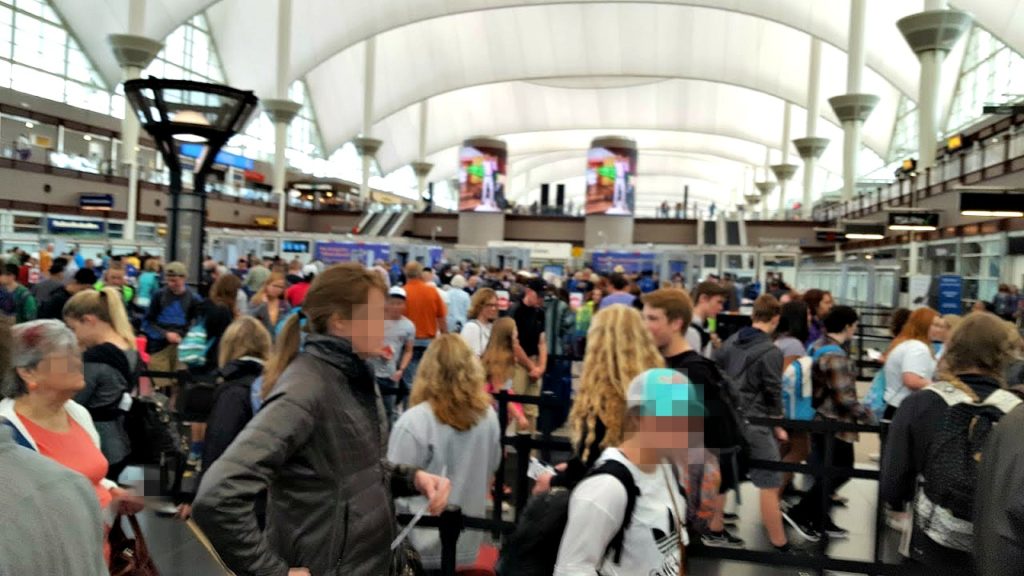
For those U.S. citizens traveling frequently internationally, consider applying for Global Entry. Global Entry is a program of the U.S. Customs and Border Protection service. This program allows pre-approved, low-risk travelers to receive expedited clearance through automatic kiosks (skipping the long customs and immigration lines) at select airports upon arrival into the United States. The fee for Global Entry is $100 for five years.
Whether you’re an experienced traveler or you have never ventured beyond your country’s border, going on vacation overseas can be overwhelming. That’s why our international travel checklist can help you remember.
Do you want to discover more travel tips? Check out everything you need to know on our blog.
